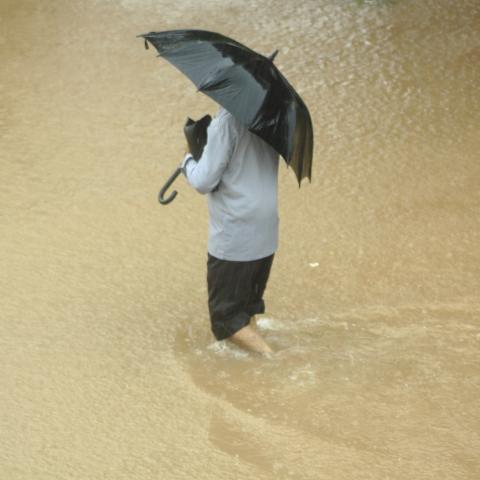Is your first thought of Indonesia a beach? Relaxing in the sunshine on a beautiful warm day, no matter the season? Indeed, the weather Jakarta, Indonesia (and the rest of the country) experiences can be delightful.
Or perhaps it’s a blustery day, threading through stalled traffic on a motorbike as buckets of rain pour down from the heavens. (One of the reasons you should always keep up with Indonesian weather forecasts!)
To be honest, the longer you visit Indonesia for, the more likely you are to experience both. Climate and weather in Indonesia can be extreme, so knowing what to expect from the weather in Indonesia all year long is essential.
The question is, how well will you be able to describe these experiences in the local language?
Since the weather is something we all experience every day of our lives, it’s a great way to break the ice with strangers. Indonesians are happy to chat with foreign visitors about anything if they speak the language, and so in this article we’ll give you the tools and the background to do just that. By the end of this article, you should be able to talk with natives about Indonesia weather like it’s nothing!
At IndonesianPod101.com, we hope to make learning about the weather and talking about the weather in Indonesian both fun and informative!
Table of Contents
- All Two of the Indonesian Seasons
- Fifteen Typical Phrases for Describing Day-to-Day Weather
- Natural Occurrences Besides the Weather
- Telling the Temperature
- Idioms and Expressions about the Weather
- Conclusion
1. All Two of the Indonesian Seasons
So let’s get this out of the way first. Whether you’re talking about Bali weather, Jakarta weather, or weather anywhere else in the country, it’s not likely to get very cold. Instead of temperature, what varies throughout the year is usually precipitation.
The year is divided into two seasons: Roughly six months of very little rain from May to September, and then six months of quite a bit more rain from October to April. These two seasons are known as musim kemarau or “drought season,” and musim hujan meaning “rain season,” respectively. Musim hujan, by the way, gets translated to English sometimes as the much more evocative “monsoon season,” but it’s nowhere near as dangerous as it sounds.
That said, weather in Indonesia by month doesn’t vary too much apart from these two seasons.
Of course, that doesn’t mean that the four seasons experienced by other countries are impossible to talk about in the Indonesian language. Everybody understands the phrases “spring” (musim semi), “summer” (musim panas), “fall” (musim gugur), and “winter” (musim dingin).
In the following sections, I’ll be going over different ways to talk about weather in Indonesia throughout the year.
2. Fifteen Typical Phrases for Describing Day-to-Day Weather
1- Hot Weather
There’s a reason this section is first. Indonesia is not a cool place, generally speaking. The word for “hot” (as in temperature) is panas in Indonesian, and this is the kind of weather in Indonesia you’re most likely to experience. Knowing this word will definitely be helpful in talking about Indonesia weather by month, considering the typical hot weather year-round.
- Waduh, panas sekali hari ini!
“Goodness, it’s so hot today!”
It’s tough to translate waduh. Just treat it as an exclamation that isn’t considered rude at all, while still carrying more weight than “wow.”
- Ingatlah minum lebih banyak air waktu panas.
“Remember to drink more water when it’s hot.”
You’re likely to get this kind of advice from locals. They know foreign visitors often find themselves gasping at the heat, and so they’re here to helpfully remind you to stay healthy even when you feel uncomfortable.
- Mas, bisa mengecilkan AC?
“Hey mister, can you turn down the AC?”
This might seem like a strange question at first, given the context. But tons of taxi drivers like to absolutely blast the AC in their cars, and after a few minutes your teeth might start chattering.
- Kalau Anda tinggal di daerah laut, cuaca lebih lembap.
“If you stay (in a hotel) near the sea, the weather is more humid.”
Of course, if you’re used to anything even approaching kering “dry” cuaca “weather,” the climate in Indonesia is going to be extremely lembab, or “humid,” for you. Now that we’re on the topic of moisture…
2- Wet Weather
All too often, when it rains in Indonesia, it pours. Sometimes there’s little to no warning about how much the skies are really going to open up.
- Kelihatannya akan segera hujan deras.
“It looks like it’s going to rain really hard soon.”
If you get caught out on the street during a cloudburst, you may want to head to the nearest convenience store for something to keep you dry. These words will be quite helpful:
- Ada jas hujan di sini? Ada payung?
“Do you have ponchos here? Do you have umbrellas?”
You may happen to be from a place where ponchos aren’t as commonly worn in the rain. Just try holding an umbrella while driving a motorbike, and see how much you miss ponchos then.
- Kita tidak bisa ke sana. Ada banjir.
“We can’t go there. There’s a flood.”
Thanks to the intensity of sudden rains combined with a sometimes lacking road drainage system, it may be quite a shock to you to see how fast the water can rise in the streets. This happens especially often in certain areas of Jakarta, giving that city a reputation for flooding in the rainy season.
Fortunately, in most cases, the water is just a nuisance instead of a real danger. Your shoes should dry overnight if you keep them inside. Besides:
- Kamu lebih baik tidak jalan-jalan waktu hujan.
“You shouldn’t go walking when it’s raining.”
In Indonesia, most people believe that going out in the rain causes people to get sick. Whether or not you think the same, it’s just common sense that you should postpone your stroll until later. The clouds are known to clear as fast as they form, anyway.
- Hujan sudah berhenti belum?
“Has the rain stopped yet?”
This simple sentence is actually an extremely useful pattern that you can use with tons of different verbs. Belum means “not yet,” so you’re literally saying “Rain stop, (or) not yet?”
3- Cold Weather
What’s cold weather doing here if all I’ve been doing so far is talking about how hot it is? Well, remember: You can talk about other places than just Indonesia. The Indonesian diaspora around the world certainly experiences cold weather too!
- Di sana dingin setiap malam.
“It’s cold there every night.” - Apakah bersalju di musim dingin?
“Does it snow in the winter?”
If you’re from a faraway country, curious locals might ask you this question—even if you’re from a place like Miami or Barcelona.
- Cuacanya tidak cukup dingin sehingga turun salju. Tapi ada gunung di mana orang bisa bermain ski!
“The weather doesn’t get cold enough to snow. But there are mountains where people can ski!”
And if you end up going up into the mountains of Kalimantan or Papua, you’ll feel the urge to bundle up, too.
When it’s cold, wind chill makes things even worse. That’s actually one of the times you might find yourself shivering even without going some place really exotic. You get up on top of a peak for an afternoon hike and find that the wind is practically blowing you over!
- Angin kencang sekali di sini! Ayo pergi!
“The wind is so strong here! Let’s go!”
Lastly, Indonesian rain does in fact have a middle setting between “off” and “heavy.” The word for a light rain or drizzle is gerimis, which you can remember because it sounds kind of like “gray” and “miserable,” the general color and feeling during that kind of rain.
- Biasanya ada gerimis setiap pagi.
“There’s usually a drizzle every morning.”
It’s good to keep in mind that Indonesians rarely complain very much. If you’re too negative, you might find yourself in an awkward situation where your host wants to try to solve the problem for you. So when you’re talking about weather you don’t like, keep it light and simple!
3. Natural Occurrences Besides the Weather
More than just rain and wind happens in the natural world. One thing Indonesia is regularly in the news for is volcanic eruptions, which—while not exactly weather events—still get talked about in a similar way and have their own set of vocabulary.
An “eruption” is formally called a letusan, while a “volcano” is a gunung berapi (literally “mountain with fire”). A more poetic term for an eruption, though, is batuk, literally “cough.”
- Gunungnya batuk malam ini.
“The mountain coughed this evening.” (The volcano erupted this evening.)
Certain types of eruptions don’t have any lava flow associated with them, but they do end up spewing a bunch of abu, or “ash,” all over the place. The ash cloud can be blown across entire cities, resulting in a fine dusting over a large area known as hujan abu or “ash rain.” Note that this is dry, so it’s different from actual precipitation mixed with ash in the air—but both are unpleasant to be outside in.
Another natural event that happens with some frequency in Indonesia is an “earthquake,” or gempa bumi. These rarely make more than local news because they’re not often strong enough to cause any damage, just a gentle swaying of the lights in your room.
- Gempa bumi yang terjadi kemarin tidak parah.
“The earthquake that happened yesterday wasn’t serious.”
Air pollution is another noticeable problem in some areas. Built-up metropolitan areas suffer from chronic congestion, and when you’re in the thick of a crowd of idling motorcycles, the fumes can make your eyes water in seconds.
For that reason, lots of people buy cheap single-use or washable face masks that serve the dual purpose of blocking some of the pollution while also preventing a hilarious helmet-shaped tan line around your face.
Protip: If you rent a motorcycle, throw a pack of masks in the little storage compartment for when traffic strikes. Otherwise…
- Saya lupa membawa masker.
“I forgot to bring my face mask.”
4. Telling the Temperature
To talk about Indonesian weather by month, knowing temperature terms is a must. This is an essential aspect of Indonesian climate and weather, and you should know a little about this to better understand Indonesian weather forecasts.
Indonesia uses degrees Celsius. This is actually a somewhat unusual word in that it’s been adopted wholesale into Indonesian, but the spelling didn’t change. So it’s pronounced selsius but spelled celsius. The word for
“temperature” is suhu.
Here, you’ll find some phrases you can use to talk about Indonesia weather and the temperature year-round.
- Suhu hari ini lebih tinggi daripada kemarin.
“The temperature is higher today than it was yesterday.”
The word for “degrees” is derajat. Equally interesting (to me at least) is that in the English phrase “degrees Celsius” the adjective comes after the noun, just like in Indonesian.
- Sekarang suhunya minus sepuluh derajat Celsius.
“The temperature right now is minus ten degrees Celsius.”
5. Idioms and Expressions about the Weather
Probably the very first idioms that English learners hear about in class are “raining cats and dogs” and “every cloud has a silver lining.” These are the most common and accessible for a reason. Everybody understands that weather can represent quite a lot symbolically.
In Indonesia, too, weather-related terms can talk about more than actual Indonesian climate and weather.
Here are two phrases and three idioms in Indonesian that use the weather as a metaphor for something else. Can you guess the meaning before reading the explanation?
- makan angin
Literally: “eat wind”
Instead of snacking on the breeze, this phrase means “to get fresh air.” You know the feeling; it’s hot and stuffy inside, and you just want to go outside and get a mouthful of clean air to clear your head.
Di sini terlalu panas, saya akan keluar makan angin.
“It’s too hot in here. I’m gonna go outside for some air.”
- masuk angin
Literally: “enter wind”
Just to show you how versatile wind can be in Indonesian, here’s another. This phrase means “to get a cold.” There’s actually a popular herbal cold remedy under the brand name Tolak Angin, or “repel wind.”
Anton sakit. Dia masuk angin.
“Anton is sick. He has a cold.”
- Kemarau setahun dihapuskan hujan sehari.
“A year of drought is washed away by a day of rain.”
This idiom is pretty self-explanatory, actually. A long-running feud or a long-lasting period of suffering can be brought to balance once more by a single act of kindness or love. Of course, it can also go the other way. Trust built up between people for years can be destroyed by one misdeed.
- Mengharapkan hujan turun, air di tempayan ditumpahkan.
“Expecting rain to fall, the water that has been saved is thrown away.”
Here, the meaning isn’t quite so obvious at first. This is a piece of advice for planning for bad outcomes. In other words, it warns against expecting only good things to happen. It describes someone who is so sure of a lucky break that they risk everything all at once.
6. Conclusion
There’s no better way to actually remember all these words and phrases than to use them. One of the best ways to practice is simply by reading some Indonesian weather forecasts online; just go to a website like Kompas and head to the cuaca section.
Simply read a single article every day or so for about a month, and you’ll know all the Indonesian vocabulary you need to talk about Indonesian climate and weather like the back of your hand.
You can also check out our lessons here on IndonesianPod101.com. Combining audio reinforcement with your other studies is a fantastic way to make your speech totally automatic.
That way, when it comes time to relax in Bali, call a cab during a Medan thunderstorm, or walk around in the weather Jakarta poses that day, you’ll be totally prepared for jabbering about the weather with anyone nearby.
We hope you now feel more prepared for Indonesia weather, and that you know what to expect year-round.
Before you go, be sure to drop us a comment to let us know what you thought of this article! Did you learn any new Indonesian weather vocabulary, or new facts about Indonesian weather you didn’t know before? We look forward to hearing from you!
Author: Yassir Sahnoun is a HubSpot certified content strategist, copywriter and polyglot who works with language learning companies. He helps companies attract sales using content strategy, copywriting, blogging, email marketing & more.


















